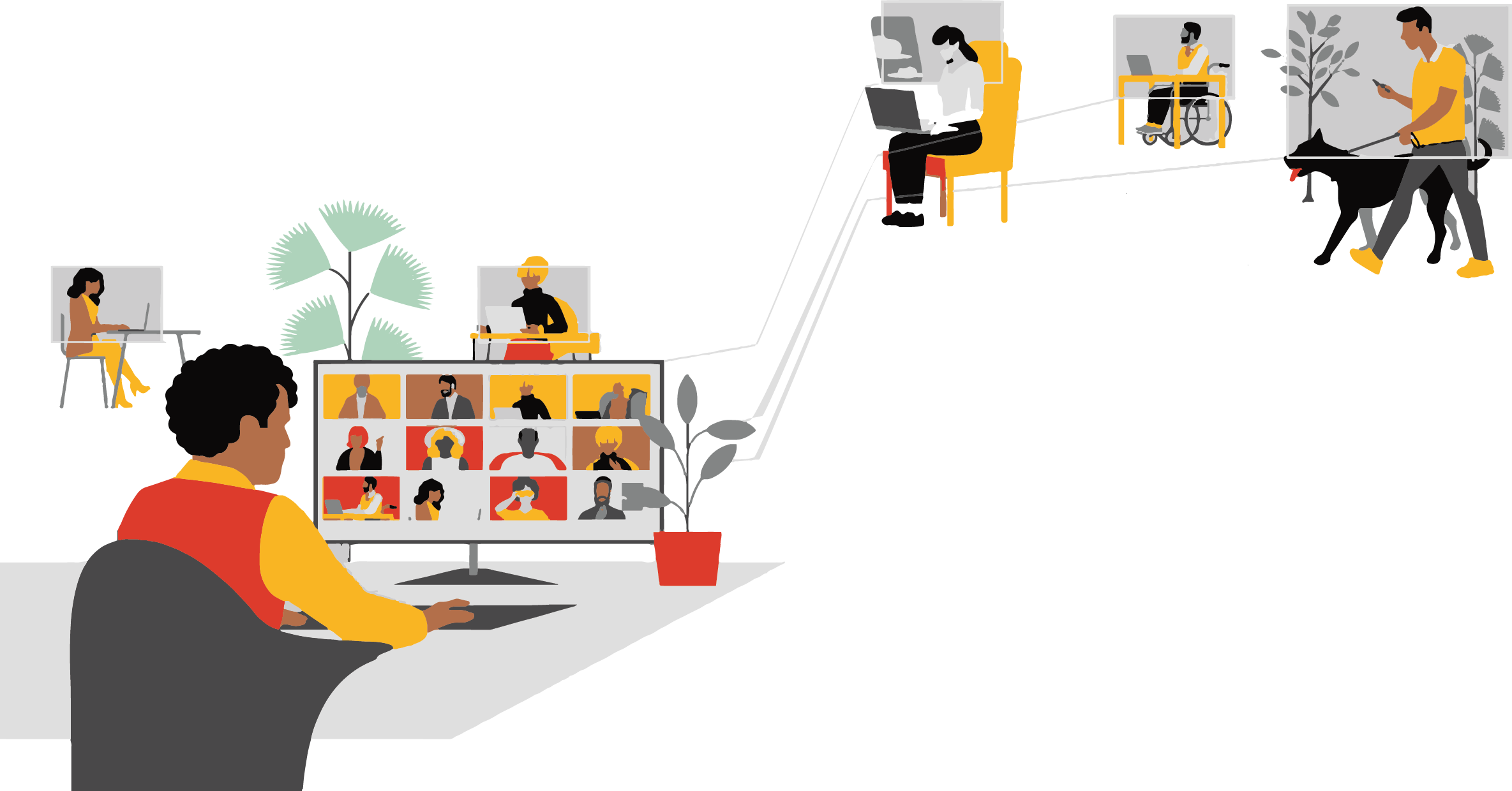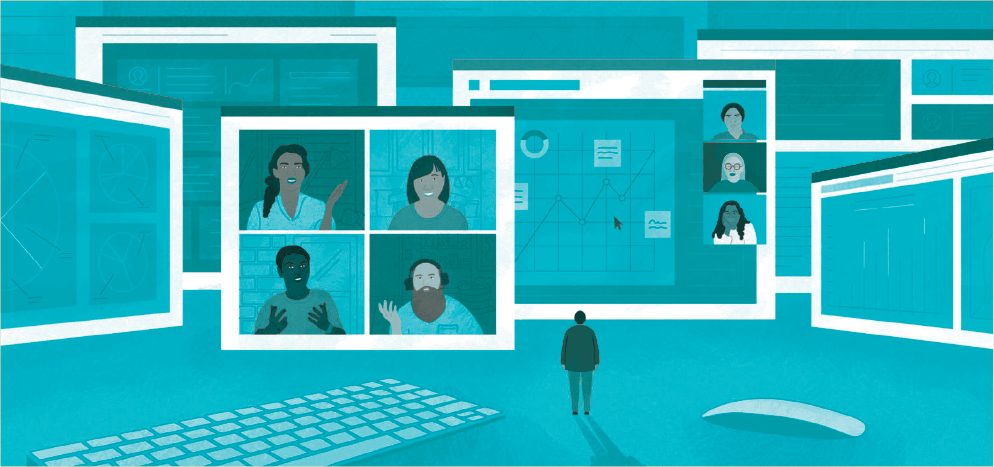Flexible office schedules, shorter work days, remotely connected employees, and the ever-increasing scope of technology in the business world – the employees of today find themselves in a completely different environment from that of their predecessors. As they scramble to make their mark in the highest echelons of the business world, it remains to be seen who can make a smooth landing and whose fate awaits the choppy waters of redundancy.
COVID-19 was an era of upheaval. From governments to people, the disease swept everyone in its wake and now that the worst is over, one almost feels like the pandemic was here to show us certain glaring loopholes in a number of our systems. The epidemic may be receding but its effects are far from over. While it may have been possible, in the past, to turn a blind eye to the cracks in our system, in the post-pandemic era, the gaping crevices are too obvious to ignore. One such sector that has been turned on its head in these rough times is the business industry, and with it, the work culture as we knew it.
The world was moving too fast. Technological advances at unprecedented speeds had the business arena constantly on its toes and every company around the world was virtually killing its employees to ‘keep up.’ Remote work was already a reality in certain economies around the world but its acceptance was low. When the spread of the coronavirus force-stopped the global economy, it also gave these burnt-out, overworked employees a chance to stay home and realise the sheer significance of what they had been missing out on. For the first time in a long time, workers took a break, spent time with their families, had their morning and afternoon meals with their children, connected anew with their spouses and just unclenched those jaws a little bit. They understood that companies would continue to run even if they physically didn’t. Meetings could be turned into emails, the bed or the couch could become the office desk and board rooms could become zoom screens, without a significant dip in productivity levels. That’s when mass perspectives changed and two years later, the world is feeling the effects of it.
The health dangers may be over, but employees are unwilling to make it back into the rushed and frenzied world they have left behind. They seem to be pushing against the current and winning. Where the percentage of people who worked from home rested at 5% during peak pandemic time, this number is likely to rest somewhere between 20-30% in the new normal. The statistics are expected to rise in the future. The remote work culture is a reality, however hesitant, or reluctantly it may have been conceded.
To be fair, the pandemic was simply one of the many proponents of the rise of remote work. As we enter the fourth industrial revolution, the world is deskilling at an almost alarming rate. Mundane, clerical jobs are being automated and more priority is being shifted to jobs that deal with data analysis and interpretation – intellectual work that does not necessarily require presence in an office space.
With the transformation in the work culture, the structure of jobs is also on the brink of massive change. Factors like digitisation, upskilling, deskilling, reskilling and virtual collaboration are on the rise and will become the major components of future jobs. Most educational institutions are rushing to fill gaps with their specially curated courses, online learning opportunities and vocational training in popular technology like AI and Machine Learning. These courses aim to increase a trainee’s computational and problem-solving, design thinking and decision-making skills. Businesses too are giving in and investing in cutting-edge technology and collaborative remote networking and virtual workspaces. The concept of working a set number of hours from one place is fast going out the door and a culture of lifelong learning and digitisation is taking its place.
Companies, while open to the idea of remote work, are still trying to come to terms with this drastic shift in the job structure of these times. Assertive employees with clear plans about how they want their jobs and their lives to be, have dictated their terms and made their point by giving rise to the ‘Great Resignation,’ in various parts of the developed world. Businesses that did not comply with employees’ shifting priorities of a better balance in their work and personal lives faced severe walk-outs. Those that embraced the change found that their choices were no longer limited to a certain geographical area. Instead, they are able to hire fresh, innovative, remote, and diverse talent and expertise from different parts of the world.
Where the percentage of people who worked from home rested at 5% during peak pandemic time, this number is likely to rest somewhere between 20-30% in the new normal.
Workers nowadays know what they are good at and what they can offer to the market, and they are in better control of how they wish to work and get paid. This has given rise to what is known as the gig economy. The gig economy is nothing but the culture of offering and accepting work on short-term contracts. This is in stark contrast to the past culture where the company was lauded for being able to retain loyal employees for longer. Today’s job market is about identifying immediate company needs, sourcing an employee to fulfil those needs, paying them for their expertise and setting them free to scout for other opportunities on offer. The turnover is cost-effective for companies in many ways as they do not have to spend on incremental employee benefits over the long years that an employee is retained. Moreover, as the traditional brick-and-mortar existence of companies change, and the company culture loses its place of high honour, corporations worry less and less about training employees to suit their company. A fewer number of employees in the office means lower overheads for employers and a lower carbon footprint on the environment. Employees also have the autonomy to change their work profiles, upgrade themselves and renegotiate their services over time.
There is a continuing debate as to whether gig workers who do not attend conventional offices should receive the sort of benefits that full-time employees do, such as medical insurance, paid leaves or retirement plans. As the gig economy is here to stay and expand, more and more companies are wondering if depriving these contractual employees is leading to income inequality. This is particularly in light of the fact that more and more insurance companies are taking gig workers into account and designing schemes to protect them. Similarly, gig companies are cropping up all over the place and spaces like Fiverr and Upwork offer space to gig workers to advertise themselves and scout for opportunities – again, without a lot of legislation governing their rights.
The global economy is going through a tumultuous time. Thanks to the scars left behind by the pandemic, a lot of which are not even visible yet, rising inflation around the world, the Great Resignation and the ongoing war between Russia and Ukraine, the world is going through a major revamp and even experts are approaching this newly emerging global economy with some trepidation.
However, if history has taught the world anything it is that fighting for change has never paid off. Around 72% of workers in the major economies of the world are advocating for a hybrid work model, which combines the advantages of remote work with the benefits of intermittent social interactions, and a mere 12% truly wish to come back to the old work structure. With such large numbers pushing for change, a colossal transformation is imminent. This change may not be the best for those workers whose jobs revolved around people going to workplaces such as office cleaning staff and transport workers among many others. If the economy is to move forward, some serious thought may need to be dedicated to helping workers in these sectors and giving them an additional push.
As if to assure workers of their intent to go along with the changing job structure, many companies have gone for a ‘virtual first’ setup, offering employees a virtual workspace before a traditional office setup. They are ensuring that their office is ready for such a reality, by adopting technology such as video communications, digitisation techniques, cloud access, AI and more. They are also making sure that the culture in the company is one of trust and belonging even if not restricted to a particular place or space. According to a survey by McKinsey in August 2020, some 278 participant companies were looking to reduce their workspace by 30% in the coming months and years, a testament to their growing belief in the changing system.
Change in any form has always been uncomfortable but once people get over past inertia, it also has the potential to bring about huge benefits for the world. For economies, this will mean that development will spread equally to different areas of the country and not remain limited to metro cities or job hubs only. For any company or employer who has thus far believed that they can do better and speed things along for themselves and their company, this is their chance. While the business environment is still volatile, from the looks of it at least, it seems as if the next generation of workers will belong to the knowledge economy, thanks to a culture of lifelong learning and constant upskilling, have a smoother work-life transition owing to flexible time and work options and the mutually reverent relationship between a knowledge worker and a cherishing employer will be much more rewarding than the chaotic and harrowing work experiences of the past.
















